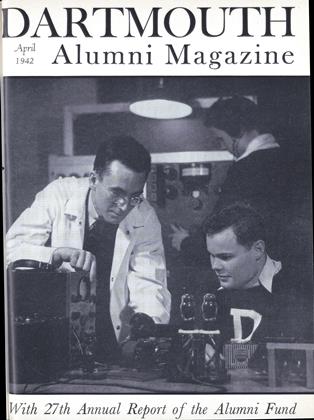CAMP GRANT, Ill.—Eighteen months of active service with three different European armies in the present war couldn't provide enough action to suit William T. Mock '34 of Chicago. Today he is in another army—the fourth in less than three years—and hoping for an overseas assignment.
With a bachelor's degree from Dartmouth, a master's degree from Northwestern, and just a few hours of study remaining before he can receive his doctorate, Bill Mock was inducted into the United States Army at the Camp Grant Reception Center.
Already a veteran of this war, soldiering is not new to him. However, Camp Grant officers have agreed to overlook, for the present, any minor mistakes he makes in saluting or the rendering of other military courtesies.
It isn't that Mock has difficulties in recognizing officers. He can spot one a block away, which is far better than most recruits. But now and then he catches himself in a French, Finnish or Polish salute, when it should be strictly according to the customs prescribed by the United States Army.
Soldiering comes natural to him, since his father was a lieutenant colonel in the Surgeon General's office during the last war, but his first enlistment in this war was a result of circumstances, in a great measure.
In June, 1939, he went to Paris to study at the Sorbonne, but his work was cut short there by the outbreak of war.
"I worked for more than two years to get to Europe," he explained, "and I wasn't going to let any war chase me from the continent that easily."
Since study was impossible at the moment, he joined the Iroquois Ambulance corps, which later was combined with the American Volunteer Ambulance corps founded by the Paris post of the American Legion. He wanted to get into a combatant unit, but since the United States was neutral then the ambulance section was the only branch in which he was permitted to serve.
After a brief period of training in the French Army his outfit was sent to Finland and he stayed with those hard-fighting Finnish forces for the next four months.
Never caught short if he could help it, he took his exit from there when it became apparent that the troops could hold out no longer and early in April he headed down through the Scandinavian countries just a few days before the Germans took over.
Flying back to France, he left the Ambulance corps and continued on to Poland where he joined the American Volunteer Ambulance section founded by Ted Schultz, son of Mrs. Biddle, the American ambassador.
Schultz took Mock and the rest of his newly formed organization into Normandy and then on to the Eastern front where they joined the forces which were backing up the Maginot line.
Again misfortune played havoc with plans, and when the great break came through north of the Maginot, Mock got separated from his unit and headed back to Paris in his ambulance to help evacuate some of the thousands who were leaving that hot spot.
En route to join the Matchek brigade, he got lost, as a result of misdirections given by fifth columnists, he claimed. A few hours later the entire brigade was wiped out in a surprise attack.
Mock turned toward Cezanne, then, and typical of his attitude were his actions when an Italian Air unit attempted to keep him and several other motorized units from reaching Cezanne. Sweeping down from the skies, the planes started pouring hot lead from their machine guns. Unperturbed, he said he drove his vehicle into a woods, whipped out a good book from under the seat, and settled down to some quiet reading until the Italians had finished.
"The machine guns didn't bother me," he said, "I had a dog in my ambulance to protect, and that caused me more worry."
Arriving at Montrichard, he found nearly 300 wounded and dead bombing victims. His was the only ambulance and there wasn't even a hospital in the village. Eighty-seven of the victims died before they could be given treatment.
In the meantime the remainder of Schultz's unit had returned to the French coast and sailed for Britain. Mock tried to join them, but he could find no boat that would take his ambulance.
"I felt there was no use in going if I didn't have that with me," he said, so after many attempts he gave up the idea of rejoining his buddies, and returned to Paris late in the summer.
He sailed from Lisbon on the Siboney and arrived in New York ready for U. S. Army service.
(Army Times—Feb. 28, 1942).
WILLIAM B. MOCK '34 Pictured two years ago in Paris leaving for service in Finland, and now aU. S. Army recruit after serving inthree European armies.
 View Full Issue
View Full Issue
More From This Issue
-
 Article
ArticleManager of College Finance
April 1942 By ARTHUR DEWING '25 -
 Article
ArticleAssociated Schools-Fund Contributors
April 1942 -
 Class Notes
Class Notes1924*
April 1942 By A. A. ADAMS JR. -
 Class Notes
Class Notes1926*
April 1942 By ROBERT E. CLEARY -
 Class Notes
Class Notes1937*
April 1942 By DONALD C. MCKINLAY -
 Class Notes
Class Notes1939*
April 1942 By RICHARD S. JACKSON








